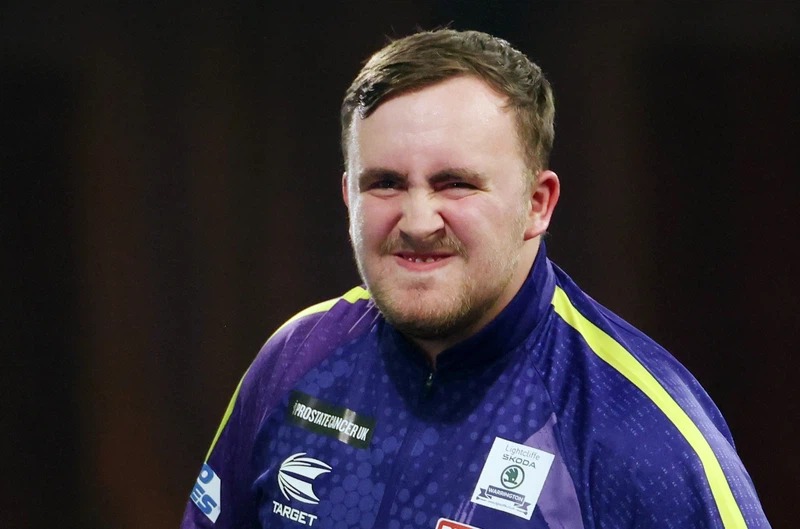
The teenage debutant’s run to Wednesday’s all-English showpiece match at London’s Alexandra Palace, where he lost 7-4 in sets to world number one Luke Humphries after having a dart to lead 5-2, earned him a runners-up cheque for £200,000 (231,941 euros) just months after his high school exams.
Premier League footballers were among the sports fans captivated by the story of Littler, who before his opening match a fortnight ago was ranked 164th in the world but now boasts close to 500,000 Instagram followers and 100,000 on X, formerly Twitter.
“I’ve had a message off Luke Shaw of Manchester United, Rio Ferdinand and I had a message off Gary Neville and Jonny Evans…so it’s just crazy,” said Littler, whose home in Warrington, northwest England, is some 18 miles from Old Trafford, before the final.
Littler’s road to becoming darts’ youngest world finalist included a 4-1 hammering of five-time world champion Raymond van Barneveld, his childhood hero and helped the sport generate television audiences in the millions.
He defeated 2018 champion Rob Cross 6-2 in the semi-final.
To its supporters, darts is a game of fine motor skills allied to mathematical knowledge, made all the harder at the professional level by the players being cheered by on by raucous and often alcohol-fuelled crowds.
Players try to hit specific small targets while standing over seven feet (2.37 metres) from the board where the most valuable ‘treble’ sections are also the smallest.
The aim is to go from 501 to exactly zero in the fewest number of darts while finishing either on a double on the outer edge of the board or the central bullseye.
Each player takes turns to throw three darts, with the highest total possible 180 – three treble 20s.
Littler, nicknamed ‘Luke the Nuke’, hit 16 180s against Cross.
Promoter Barry Hearn, a key behind-the-scenes figure in snooker’s rise to UK television popularity in the 1980s, has labelled darts “the working man’s golf”.
But there are those who question whether the lack of athletic activity involved means darts can truly call itself a sport, with Littler’s pre-match routine at the World Championships unlikely to appease the sceptics.
“I don’t wake up until 12, in the morning go for my ham and cheese omelette, come here and have my pizza, and then go on the practice board,” said Littler, also known for celebrating his victories with a post-match kebab.
But this year’s World Championship was still the subject of a feature in the Economist, a magazine known for its political analysis, on what it said was darts’ “debauched collision of fancy dress (the fans) and elite sport.”
And after the final, British Prime Minister Rishi Sunak tweeted, “Congratulations Luke, a great win tonight. What an incredible final to end a historic championship.”
Littler is no overnight success story, however, having first played as a small boy and attending the St Helens Darts Academy from the age of nine.
“When he first came as a kid you could see he was very special and he just got better and better,” said academy co-founder, Karl Holden before the final.
“He hardly lost so we said, ‘What do we know?’ We put him into the elite group, which is our best players, and he had just turned 10.”
AFP




